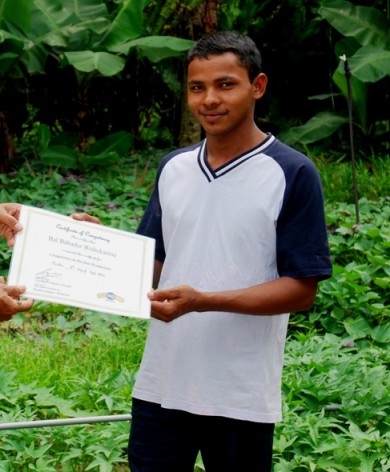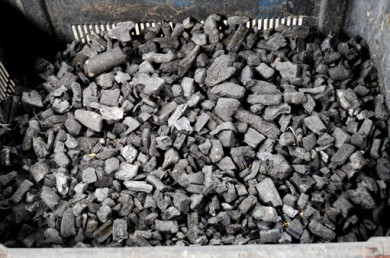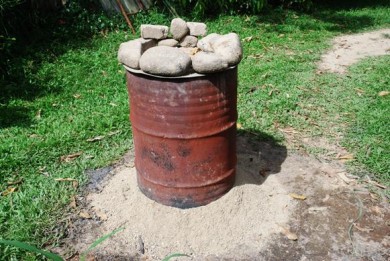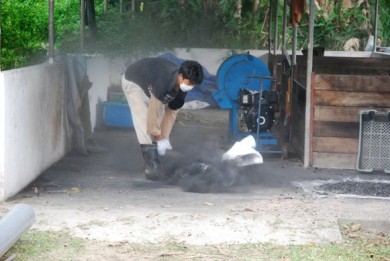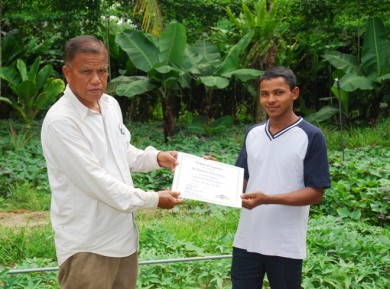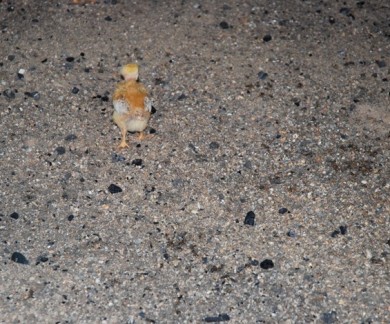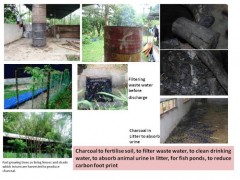Oct 23, 2011
Our Certified Biochar Producer….
Bal received our competency certificate in biochar production a couple of weeks ago.
We are very happy with the quality work he is producing now without supervison:
And am especially proud to see this early in the morning when I dropped in:
This is the work of someone who really cares about his work. He makes sure that no oxygen can enter the drum resulting in the still hot biochar catching fire, hence reducing the available biochar for use. I have not seen this before with previous workers. A few times, the entire biochar have turned to ashes due to their 'tidapathy' attitude. They were just doing their job. Bal however, cares.
When we run a farm, it is crucial that our workers take ownership of their work. And this calls for proper training and most important, recognition.
Here's Lal, another great Nepal worker smashing up the biochar for use in the litter:
17:35 Posted in Biochar, Blog | Permalink | Comments (0) | Tags: biochar, charcoal, certificate in organic farming, training of workers, biochar production, pyrolysis methods
Oct 07, 2011
Spreading The Word II
Certificate in Biochar Production
Bal Bahadur Bishokarma, from Nepal, used to make charcoal for sale at his village using traditional pit methods. Since coming to our farm, he realizes that our methods are less wasteful and involves less physical work. He now knows the importance of planting trees for charcoal production rather than cutting down forest trees.
Here he is receiving his competency certificate from Razaly, the farm director.
At the farm, for each of the planted trees he cuts down for biochar (biochar is charcoal used for soil amendment generally using less 'dense' material) production, he has to plant five.
The tree of choice here at our farm is gliricidia sepium (for biochar) and acacia mangium (for charcoal). They are fast growing and hence are excellent carbon sequesters.
The resultant biochar has multiple uses at our farm. The main use is in the chicken litter to reduce free gaseous ammonia which can cause inflammation in the respiratory tracts of young chicks.
We have done tests at our farm to see if soil amended with biochar versus unamended soil has a difference in productivity. The results show no significant difference. The reason would seem to be that our soil is already very rich in microbial population and was never intensely cultivated. Perhaps in areas with less fertile soil and subject to repeated cultivation, biochar amendment may produce results as per the writings of many advocates.
At the farm, our biochar production is to reduce our carbon footprint by sequestering carbon (CO2) from our animals using fast growing trees. These trees are then used to produce biochar which are used in our poultry and aquaculture operations, and to filter discharge from our farm.
When Bal returns to Nepal, hopefully, he can make a living out of producing biochar and charcoal on a sustainable basis.
15:35 Posted in Biochar, Blog, Chickens | Permalink | Comments (0) | Tags: biochar, charcoal, ammonia reduction in chicken litter, pyrolysis, gliricidia sepium, acacia mangium, biochar production
Jul 27, 2009
Charcoal for Sustainability
We produce our own charcoal for multiple use at the farm: to bury carbon as part of the requirement for responsible animal husbandry, to use it to absorb urine and reduce ammonia in litter, to act as a filter in aquaculture, to clean waste water before discharging into rivers, to use as fertiliser for our fruits and vegetables, and to use as a more efficient source of fuel.
We plant fast growing trees such as acacia mangium and gliricidia septium as a renewal source of wood for charcoal production. The fast growing trees are planted where ever we have chickens, even right next to the coops or rebans.
In the fields, they not only convert CO2 to carbon, but also absorb nutrients from the chicken dung.
In this way, we try to reduce our carbon footprint, which should be a required part (and parcel) of the process of raising animals for food.
Click on the picture below for enlarged view:
09:45 Posted in Sustainable Farming | Permalink | Comments (1) | Tags: biochar, retort, sustainable farming








